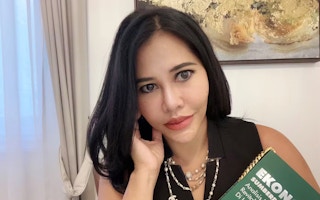Aida Greenbury has resigned from the board of directors of the High Carbon Stock Approach (HCSA) Foundation, the non-profit’s funding entity.
The former chief sustainability officer of Asia Pulp and Paper (APP) announced the news on social media platform X on Friday.
Greenbury joined the board of the voluntary framework established to help forest-risk companies meet no-deforestation commitments in 2020. She was a founding member of the organisation, and co-chaired the non-profit for a two-year period with environmental campaign group Greenpeace.
In a social media post, she said: “It is now time to continue the fight on other platforms that need me more.”
Grant Rosoman, senior advisor, forest solutions at Greenpeace International, director of HCSA Foundation and a member of HCSA Steering Group, said Greenbury’s resignation is “a big loss”.
“Aida has contributed so much to get HCSA established as a global no-deforestation initiative. She has been a great ambassador for HCSA, promoting the organisation at COPs [climate negotiations] and global events, building relationships with donors, and in the last few years supporting smallholders in HCSA. She will be missed.”
Kiki Taufik, global head of Greenpeace Southeast Asia’s Indonesian forests campaign, said that while Greenbury worked for APP, the Indonesian pulp and paper company adopted HCSA as part of its 2013 no-deforestation pledge, and she championed HCSA until she left the company in 2017.
After Greenbury left, APP’s commitment “began to unravel in with ongoing deforestation and peatland clearance,” Taufik said, referring to a recent report the environmental campaign group released on APP’s 10-year old sustainability pledge.
Greenbury told Eco-Business that she will now spend more time helping smallholders implement deforestation-free practices, conserve their customary forests, and receive fair treatment through her role as sustainability advisor for the oil palm independent smallholders union, SPKS.
“I have been humbled to be trusted by them to amplify their voice and strength. Smallholders cannot be undermined anymore,” she said.
SPKS has also resigned from HCSA, effective 1 December 2023.
SPKS joined the HCSA Steering Group and executive committee in 2018 as the only smallholder member.
Sabarudin, head of SPKS, said in a statement that the organisation would continue to implement and reference the HCSA toolkit for smallholders in Indonesia, but would be focusing its efforts on working towards compliance with the EU Deforestation Regulation (EUDR). EUDR obliges farmers to prove where they cultivated their crops.
Numerous other organisations have resigned from HCSA over the past few years, including the world’s largest foods company, Nestlé, and palm oil companies Wilmar International, Golden Agri-Resources, Sime Darby Plantation and IOI Group.
Publicly cited reasons for quitting the organisation include governance issues, Covid 19-induced budget constraints, and an overlap in function between HCSA and the Roundtable on Sustainable Palm Oil (RSPO), an eco oil palm certifier.
Conservation groups have said that by leaving HCSA, companies are flouting their responsibility to report transparently on progress to meet sustainability commitments and are inviting regulations such as the European Union’s Deforestation Regulation.
HCSA was set up in 2014 to give companies linked to the palm oil and pulp and paper sectors a methodology that distinguishes areas that can be developed from those that should be protected.





















